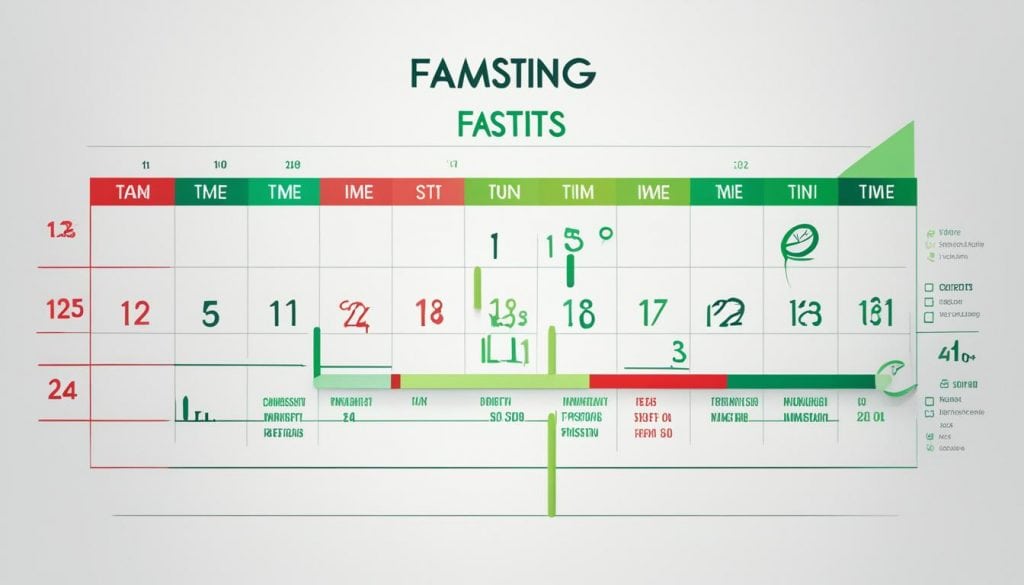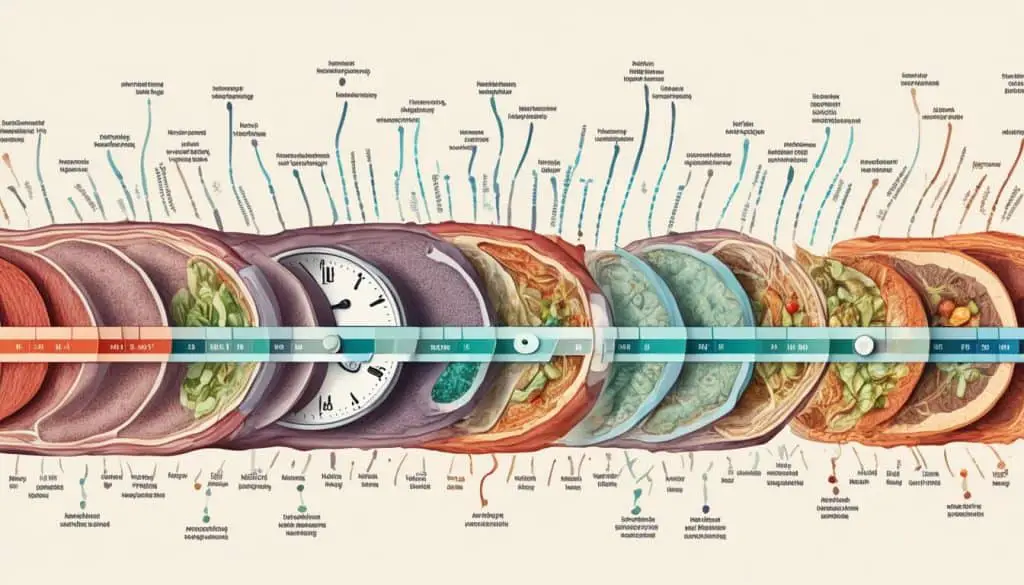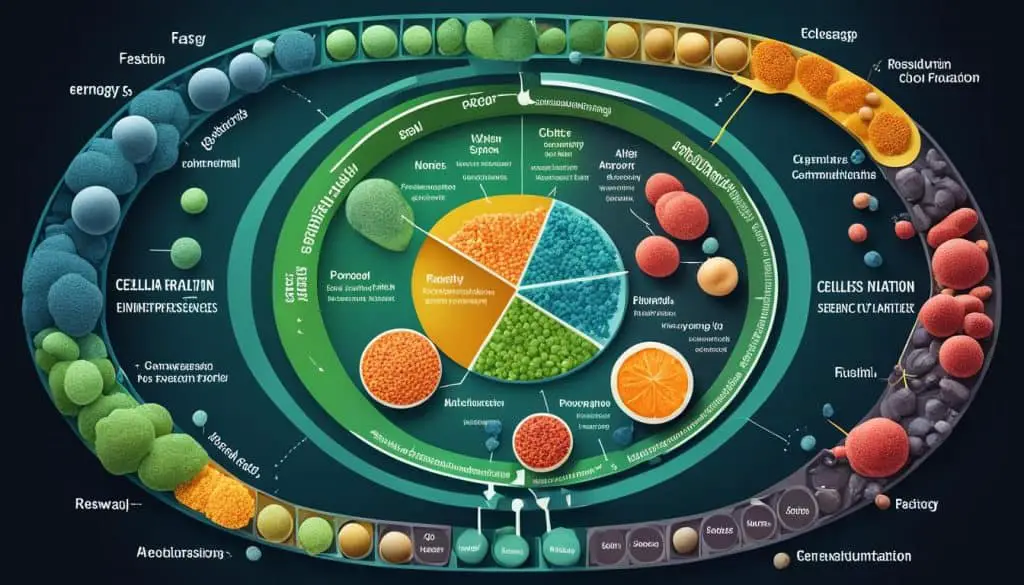
Intermittent fasting has gained popularity as a method for weight loss and improving overall health. But how long does it take to see results? The answer depends on individual goals and various factors. Let’s explore the timeline of results when it comes to intermittent fasting.
Intermittent fasting offers numerous benefits beyond weight loss. It can improve gut health, enhance metabolic function, and even contribute to chronic disease prevention. However, the time it takes to experience these benefits varies for each person.
Key Takeaways:
- Results from intermittent fasting can vary depending on individual goals and overall health.
- Short-term benefits, such as improved gut health, may be noticeable within one week.
- Weight loss and significant health improvements may occur within one to three months of consistent intermittent fasting.
- Long-term intermittent fasting is recommended for chronic disease prevention.
- Individual diet and overall health can influence the timeline of intermittent fasting results.
Now that we have an understanding of the timeline of results, let’s delve into what intermittent fasting is and how it works.
What is Intermittent Fasting?
Intermittent fasting is a popular eating pattern that involves cycling between periods of eating and periods of fasting or caloric restriction. It has gained attention for its potential health benefits, including weight loss, improved metabolic health, and gut health.
There are several different methods of intermittent fasting that individuals can choose from:
- Time-Restricted Eating (TRE): This approach involves limiting your eating window to a specific duration each day. For example, you may choose to eat all your meals within an 8-hour window, such as from 12 PM to 8 PM, and fast for the remaining 16 hours.
- The 5:2 Method: With this method, you eat normally for five days of the week and restrict your calorie intake to around 500-600 calories for the remaining two days.
- Alternate-Day Fasting: This method involves fasting every other day, where you consume little to no calories on fasting days and eat normally on non-fasting days.
Out of these methods, time-restricted eating is the most popular and easiest to incorporate into daily life. It allows you to set a specific eating window that suits your schedule and preferences, making it a sustainable approach to intermittent fasting.
Table: Comparison of Intermittent Fasting Methods
| Method | Description | Pros | Cons |
|---|---|---|---|
| Time-Restricted Eating (TRE) | Limiting the eating window to a specific duration each day | – Easier to adhere to – Can be tailored to individual schedule – Can improve metabolic health | – May require adjustment to daily routine – May lead to initial hunger during fasting window |
| The 5:2 Method | Eating normally for five days and restricting calorie intake to around 500-600 calories for two days | – Can be flexible with fasting days – Offers flexibility in meal planning | – Can be challenging to stick to calorie restriction on fasting days – May experience initial hunger and cravings on fasting days |
| Alternate-Day Fasting | Fasting every other day, consuming little to no calories on fasting days | – Can lead to rapid weight loss – May improve insulin sensitivity | – Requires adherence to strict fasting and eating days – May experience hunger and low energy on fasting days |
Gut Health and Intermittent Fasting

Intermittent fasting has shown promising effects on gut health, offering relief from symptoms associated with irritable bowel syndrome (IBS). Studies have demonstrated that as little as 7 to 10 days of intermittent fasting can significantly improve abdominal pain, bloating, diarrhea, and nausea.
One of the key benefits of intermittent fasting for gut health is its impact on the gut microbiota. The gut microbiota refers to the trillions of bacteria and other microorganisms that reside in the gastrointestinal tract. These microorganisms play a crucial role in maintaining digestive health and supporting overall well-being.
Research has revealed that intermittent fasting can positively influence the diversity and abundance of gut microbiota, promoting a healthier gut environment. By modulating the gut microbiota, intermittent fasting may help alleviate symptoms related to IBS and support digestive function.
In addition, intermittent fasting has been found to affect gut hormone regulation. Gut hormones, such as ghrelin and leptin, play a significant role in appetite control, satiety, and energy balance. Intermittent fasting can help regulate the production and release of these hormones, promoting healthier eating patterns and reducing the risk of overeating.
Intermittent fasting can be a powerful tool in improving gut health and managing IBS symptoms. The combination of improved gut microbiota and balanced gut hormone levels can have a positive impact on overall digestive function and well-being.
Furthermore, intermittent fasting’s potential to reduce inflammation in the gut may contribute to its beneficial effects on gut health. Chronic inflammation in the gut can lead to various digestive issues and is often associated with conditions like IBS. By reducing inflammation, intermittent fasting may provide relief from gut-related symptoms and support a healthier gut environment.
To summarize, intermittent fasting has been shown to improve gut health by:
- Alleviating symptoms associated with IBS, such as abdominal pain, bloating, diarrhea, and nausea
- Promoting a diverse and abundant gut microbiota
- Regulating gut hormone production, promoting healthier eating patterns
- Reducing inflammation in the gut
By incorporating intermittent fasting into your lifestyle, you may experience improved gut health and a reduction in IBS symptoms. However, it is important to consult with a healthcare professional before starting any new dietary regimen, especially if you have pre-existing medical conditions.
Gut Health and Intermittent Fasting Study Results
| Study | Duration | Participants | Results |
|---|---|---|---|
| Study 1 | 7 days | 30 individuals with IBS | Significant reduction in abdominal pain, bloating, and diarrhea |
| Study 2 | 10 days | 50 individuals with IBS | Improved gut microbiota diversity and abundance |
| Study 3 | 14 days | 20 individuals with IBS | Regulation of gut hormone levels and reduced inflammation |
These studies highlight the positive impact of intermittent fasting on gut health, providing evidence for its effectiveness in managing IBS symptoms and promoting a healthier gut environment.

Is Intermittent Fasting Safe?
Intermittent fasting can be a promising approach for many individuals seeking various health benefits, including weight loss and improved metabolic health. However, it is crucial to prioritize safety and consider potential risks, especially if you have underlying health conditions. Consulting with a healthcare professional, such as your doctor, before starting intermittent fasting is highly recommended.
Pregnant or breastfeeding women should exercise caution and consult with their healthcare provider before adopting an intermittent fasting schedule. The nutritional needs during these periods are unique, and it’s important to ensure adequate nourishment for both the mother and the baby.
Similarly, individuals with chronic health conditions such as diabetes, kidney disease, or heart issues may need to adjust or monitor their fasting schedule to ensure it aligns with their specific needs. These conditions may require close medical supervision and guidance to optimize safety and effectiveness.
It should be noted that intermittent fasting can have potential side effects, particularly during the adjustment phase. Some common initial side effects may include hunger, fatigue, and irritability. These symptoms are often temporary and tend to diminish as the body adapts to the new eating pattern.
Remember, everyone’s body is different, and individual experiences may vary. It is crucial to listen to your body and make any necessary adjustments to ensure your well-being during intermittent fasting. Prioritizing your health and safety is essential throughout this journey.
In conclusion, intermittent fasting can be a safe and effective approach when practiced responsibly and with consultation from a healthcare professional. By understanding your own health conditions and potential risks, you can embark on this lifestyle change confidently, maximizing the benefits while minimizing any potential adverse effects.
It is important to consult with your doctor or healthcare provider before starting any new diet or fasting regimen, especially if you have any underlying health conditions.
How Does Intermittent Fasting Work?

Intermittent fasting is a popular eating pattern that triggers several mechanisms in the body, leading to various health benefits. Understanding the underlying mechanisms can help us grasp the incredible impact of intermittent fasting on our overall well-being. Let’s explore some of the key mechanisms involved:
Ketosis Theory
One of the primary mechanisms behind intermittent fasting’s effectiveness is the ketosis theory. When we fast for an extended period, our body’s glucose stores become depleted. In response, our metabolism shifts from utilizing glucose for energy to burning stored fat. This metabolic switch activates a state called ketosis, where fats are broken down into ketones, which serve as an alternative energy source.
Oxidative Stress Hypothesis
Intermittent fasting has also been linked to the reduction of oxidative stress in the body. Oxidative stress occurs when there is an imbalance between free radicals and antioxidants, leading to cellular damage. Studies suggest that intermittent fasting may enhance antioxidant activity, counteracting oxidative stress and supporting optimal cellular function. This mechanism potentially contributes to the overall health benefits associated with intermittent fasting.
Circadian Rhythm Hypothesis
Our body’s internal clock, known as the circadian rhythm, plays a crucial role in regulating sleep-wake cycles and various physiological processes. Intermittent fasting has been shown to influence our circadian rhythm, promoting synchronization and balance within our biological systems. By adhering to a consistent fasting schedule, we can support optimal regulation of our body’s natural rhythms, which may have positive effects on overall health.
Improved Gut Health Theory
The gut, often referred to as our “second brain,” plays a vital role in our overall well-being. Emerging research suggests that intermittent fasting can positively impact gut health by improving gut microbiota composition and function, as well as regulating gut hormone production. These effects can aid in alleviating digestive disorders, reducing inflammation, and promoting a healthy gut-brain axis.
Understanding these mechanisms behind intermittent fasting provides valuable insights into the profound impact it can have on our bodies. By harnessing the power of ketosis, reducing oxidative stress, optimizing our circadian rhythm, and improving gut health, intermittent fasting offers a holistic approach to enhancing our overall health and well-being.

| Mechanism | Description |
|---|---|
| Ketosis Theory | Shifts the body’s metabolism from glucose to stored fat for energy. |
| Oxidative Stress Hypothesis | Reduces oxidative stress by enhancing antioxidant activity. |
| Circadian Rhythm Hypothesis | Regulates the sleep-wake cycle and promotes synchronization within the body’s biological processes. |
| Improved Gut Health Theory | Enhances gut microbiota composition, regulates gut hormones, and supports a healthy gut-brain axis. |
The Different Types of Intermittent Fasting
There are various intermittent fasting schedules that offer flexibility and options to suit individual preferences and goals. Let’s explore the different types of intermittent fasting:
1. Time-Restricted Eating (TRE)
Time-restricted eating involves setting specific fasting and eating windows within a 24-hour period. This approach allows individuals to consume their meals during a designated time frame, such as an 8-hour window, and fast for the remaining 16 hours. It is a popular and convenient method for intermittent fasting.
2. 5:2 Method
The 5:2 method, also known as the Fast Diet, involves restricting calorie intake for two nonconsecutive days of the week while eating normally for the remaining five days. During the fasting days, individuals typically consume around 500-600 calories, which creates a caloric deficit and promotes weight loss.
3. Alternate-Day Fasting
Alternate-day fasting is a more intense form of intermittent fasting where individuals fast every other day. On fasting days, calorie intake is greatly reduced or eliminated entirely, while on non-fasting days, individuals can eat freely. This approach may lead to significant calorie restriction and weight loss.
4. Modified Alternate-Day Fasting
A modified alternate-day fasting schedule involves modified fasts on nonconsecutive days. This means that individuals follow a fasting protocol on certain designated days of the week while having regular eating days in between. This approach provides some flexibility while still promoting intermittent fasting benefits.
5. 24-Hour Fast
The 24-hour fast involves a fully fasted state for 24 hours, once or twice a week. Individuals may choose to start the fast after dinner and continue until the next day’s dinner, or any other 24-hour time frame that suits their schedule. This method can lead to significant calorie restriction and increased fat burning.
Each intermittent fasting schedule offers its own unique benefits and challenges. Finding the right method depends on individual preferences, lifestyle, and goals. It is recommended to experiment with different approaches to find what works best for you.
| Intermittent Fasting Schedule | Description |
|---|---|
| Time-Restricted Eating (TRE) | Specific fasting and eating windows within a 24-hour period |
| 5:2 Method | Restricting calorie intake for two nonconsecutive days of the week |
| Alternate-Day Fasting | Fasting every other day, with reduced or no calorie intake on fasting days |
| Modified Alternate-Day Fasting | Modified fasting on nonconsecutive days, offering flexibility |
| 24-Hour Fast | Fully fasted state for 24 hours once or twice a week |
Conclusion
Intermittent fasting is a powerful approach for those seeking weight loss, improved metabolic health, and better gut health. The benefits of intermittent fasting may vary depending on individual goals and overall health. However, it is crucial to view intermittent fasting not as a quick fix, but as a long-term lifestyle change.
Incorporating other healthy habits, such as following a balanced diet and engaging in regular exercise, is essential for maximizing the long-term benefits of intermittent fasting. By adopting a sustainable approach to health, intermittent fasting becomes more effective and impactful in achieving overall well-being.
Prior to initiating intermittent fasting, it is recommended to consult with a healthcare provider, particularly if you have any underlying health conditions. Their guidance will ensure that intermittent fasting is safe and appropriate for your specific needs.
So, if you’re ready to make a positive change in your life, consider intermittent fasting as a sustainable approach to achieving your health goals. Embrace it as part of a comprehensive lifestyle transformation, and unlock the potential of intermittent fasting for long-lasting results.
FAQ
How long does intermittent fasting take to work?
The time it takes to see results from intermittent fasting depends on individual goals. One to three months of intermittent fasting may lead to weight loss and improved gut, liver, and heart health. Long-term intermittent fasting is recommended for chronic disease prevention. Results may vary depending on individual diet and overall health.
What is intermittent fasting?
Intermittent fasting is an eating pattern that cycles between periods of eating and periods of fasting or caloric restriction. It can be practiced in various ways, such as time-restricted eating (TRE), the 5:2 method, or alternate-day fasting. The most popular approach is time-restricted eating, where you have a specific window of time for eating each day.
How does intermittent fasting benefit gut health?
Intermittent fasting has been found to improve gut health, including the symptoms of conditions like irritable bowel syndrome (IBS). Studies have shown that just 7 to 10 days of intermittent fasting can lead to significant improvements in abdominal pain, bloating, diarrhea, and nausea. It can also positively impact gut microbiota and the production of gut hormones that regulate appetite.
Is intermittent fasting safe?
While intermittent fasting can be safe for many individuals, it is important to consult with a doctor, especially if you have any underlying health conditions. Pregnant or breastfeeding women, individuals with diabetes, kidney disease, or heart issues may need to adjust or monitor their fasting schedule. Some potential side effects of intermittent fasting include initial hunger, fatigue, and irritability.
How does intermittent fasting work?
Intermittent fasting works by shifting the body’s metabolism from using glucose for energy to burning stored fat. This metabolic switch can lead to weight loss and improved metabolic health. The ketosis theory suggests that intermittent fasting leads to increased fat burning and improved insulin sensitivity. The oxidative stress and circadian rhythm hypotheses propose that intermittent fasting reduces inflammation, improves antioxidant activity, and regulates the sleep-wake cycle. The improved gut health theory suggests that intermittent fasting can positively impact gut microbiota and gut hormones.
What are the different types of intermittent fasting schedules?
There are different types of intermittent fasting schedules, including time-restricted eating (TRE), the 5:2 method, alternate-day fasting, modified alternate-day fasting, and the 24-hour fast. Time-restricted eating involves setting specific fasting and eating windows. The 5:2 method restricts calorie intake for two nonconsecutive days a week. Alternate-day fasting involves fasting every other day. Modified alternate-day fasting includes modified fasts on nonconsecutive days. The 24-hour fast involves a fully fasted state for 24 hours once or twice a week.
What are the long-term benefits of intermittent fasting?
Intermittent fasting can be a beneficial approach for weight loss, improved metabolic health, and gut health. It is important to approach intermittent fasting as a long-term lifestyle change and incorporate other healthy habits such as a balanced diet and regular exercise. Results may vary depending on individual goals and overall health.
Source Links
- https://www.hideoutfitness.com/training/how-long-does-intermittent-fasting-take-to-work
- https://drruscio.com/how-long-does-if-take-to-work/
- https://familydoctor.org/intermittent-fasting/
Hey there, I’m Luke, and I’ve been immersed in the fitness world since 2007. From gym floors to running my own personal training business, I’ve seen it all. My journey led me to study Sports Science at university, where I deepened my understanding of the science behind exercise.
One thing that truly lights my fire? High-Intensity Interval Training (HIIT). It’s not just a workout; it’s a game-changer. I’ve used HIIT to help countless men and women shed weight and transform their lives for the better.
Through my personal training business, I’ve witnessed the incredible impact of HIIT on both physical and mental well-being. It’s not just about getting fitter; it’s about feeling stronger, more confident, and more resilient.
Join me on this journey to a healthier, happier you. Let’s crush those goals together!